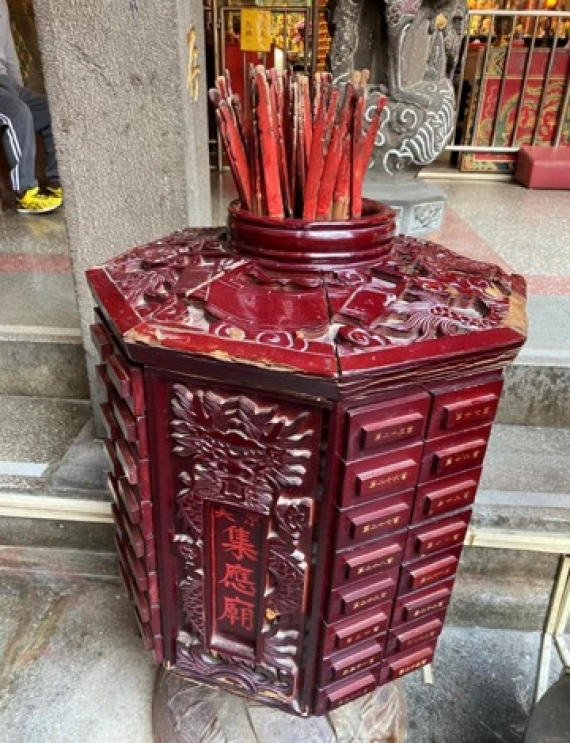Religion in Jingmei
Jingmei Jinxing Temple
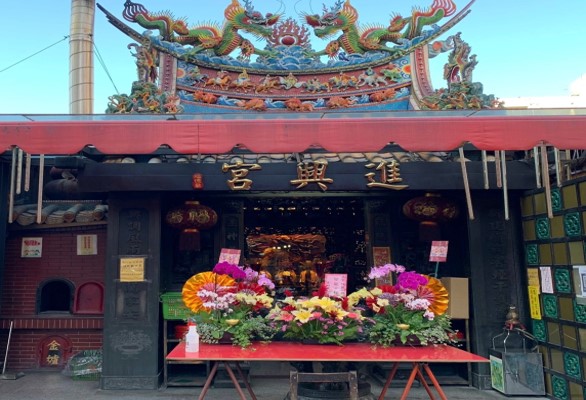
Taiwan has always been an agricultural nation, so people naturally have respect for the land. There is a Taiwanese folk saying, “There is a Land God on both ends of the rice field and a Land God on both ends of the street”, which demonstrates the common belief in Land God. Land God is also called Fudezhengshen (god of blessing and virtue), which is not a high level deity. However, most people make offerings to him to pray for safety, wealth, prosperity, and success in farming and business. He is the deity that is closest to our daily life.
In the 18th-century, people from Fujian and Guangdong began to pioneer the land around Jingmei River in Xindian. They brought the Land God belief with them as part of the Han migrant society. In the Greater Wenshan area alone there are many Land God temples that are more than a century old. The Jingmei Jinxing Temple is a Land God temple that was rebuilt on a larger scale in 1934 and serves as the religious center for the residents down the Jingwei Street.
The Land God statue in the Jinxing Temple originally had his eyes gazing slightly upward and far away, which was thought by the locals to protect people from outside the area and the reason why outsiders can make money down the Jingwei Street. Later, local senior citizens negotiated and decided to re-make a statue with eyes slightly gazing downward with the hope of bringing business to local stores.
Jingmei Street functions as a traditional market during the day and a famous night market at night. In particular, the area around Jinxing Temple is the first street leading to Jingmei Street after getting off at Jingmei metro station and taking exit 1.
In 2003, there was a housing market recession due to the spread of SARS. Lian Shan Construction Ltd., a local construction company, along with its affiliates went to Jinxing Temple to pray for successfully overcoming difficulties.
After SARS, Lian Shan Construction Ltd. turned its business around. To thank Land God, it donated to the construction of Jinxing Temple, the new Land God temple. It is a pity that the old temple was completely demolished. No cultural relics were left but waste. Regretfully, the historical development of Jinxing Temple cannot be fully understood and cultural relics are not preserved.
Ceremonial Rules of Jingmei Jiying Temple (Etiquette and Praying for Oracle Sticks)
1. Entering from the Dragon Gate and exiting from the Tiger Door
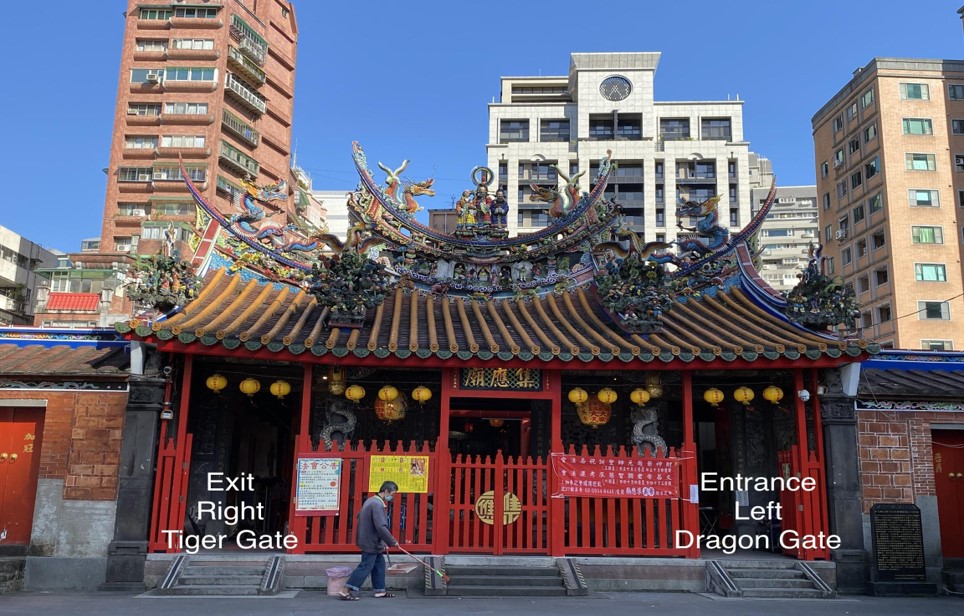
-
The Dragon Gate is located to the left side of the front temple’s central “San Chuan Hall.” The right side is the Tiger Door (based on the direction the deity is facing).
-
In Taiwanese tradition, visitors should enter the temple from the left side Dragon Gate and leave the temple from the right side Tiger Door. That is, enter from the left and leave from the right (in a counterclockwise direction). The folk saying “entering from the Dragon Gate and exiting from the Tiger Door” is meant to bring good luck and avoid bad luck. Doing the opposite constitutes the taboo of “entering the tiger’s mouth.”
2. How to pray and make an offering
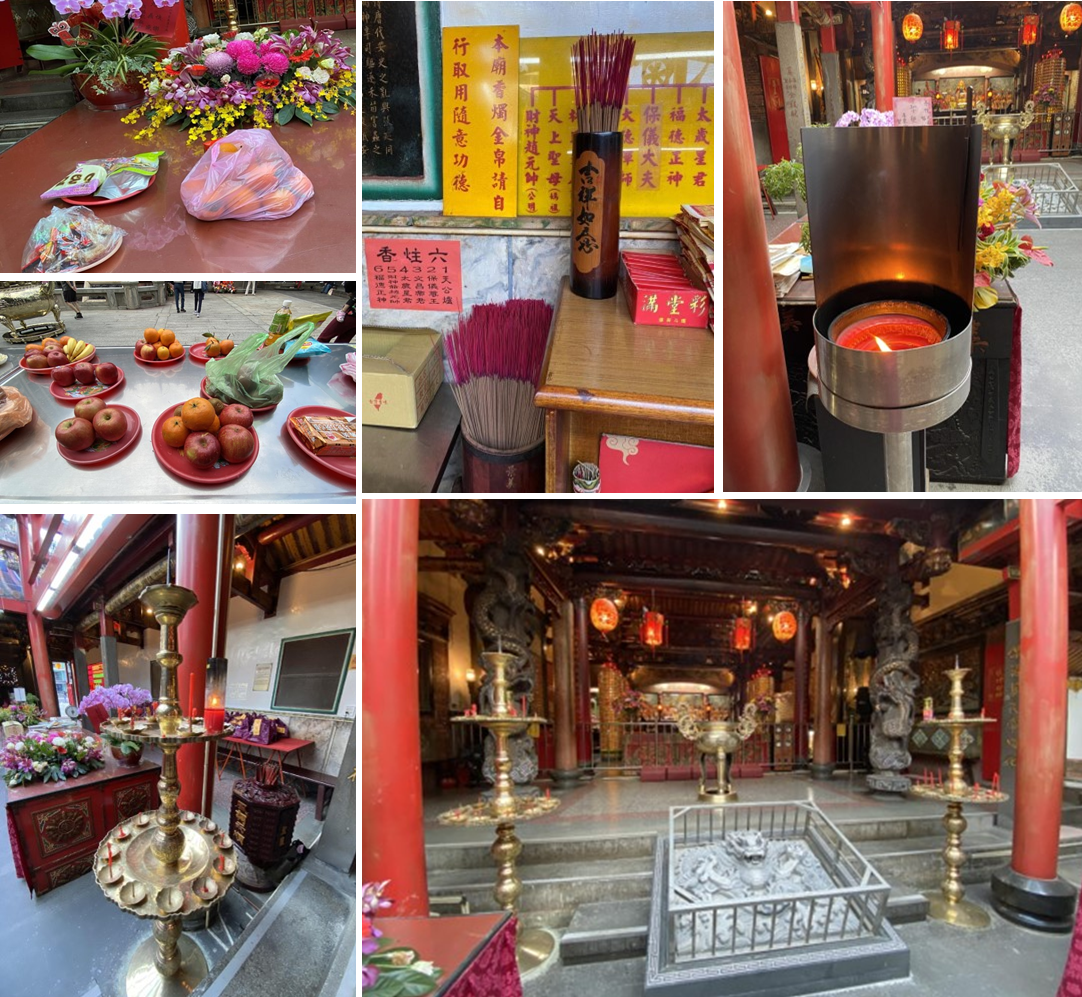
-
Bring your offering and place the offering on the offering plate that is provided. Place the offering on the table (optional).
-
Get your incense and candle, and light them (optional).
-
Make your tribute money (generally, if you use the temple’s incense, you will make a tribute; the amount is not set and up to the individual).
-
First, pray to the Heavenly Emperor (with incense or clasped palms). After you are done, place a stick of incense in the Heavenly Emperor’s incense censer.
-
Turn around and face the center of the main temple. When making your prayer, face the deity and piously recite your name, birth date, current address, and the things you wish to pray for. Make prayers in the sequence shown on the right side table. Bow three times before and after you make your prayer to show respect and gratitude to the deities.
3. Different deities have different responsibilities
-
Deities watch over every person from birth to death, and different deities have different responsibilities. Please pray to the deities in sequence.
-
Martial god of wealth, Zhao Gong-Ming: health
-
Wenchang King: studying and examination results
4. Tossing the divination blocks (jiaobei)
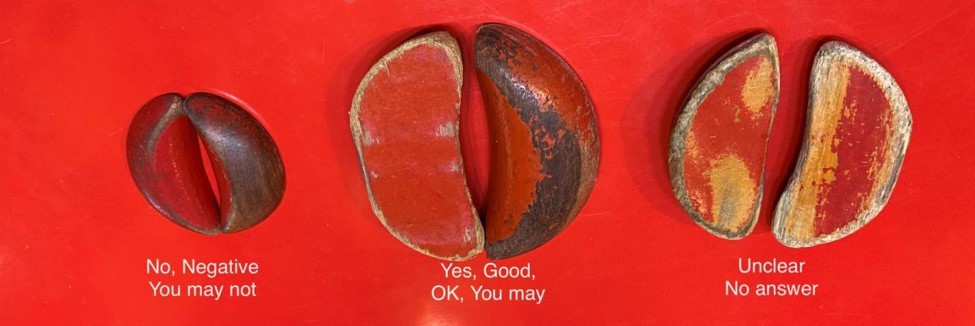
-
The aim of tossing the divination blocks is to seek guidance from the deities. When tossing the divination blocks, place two blocks in the palm of your hands. Tell the deities your name, age, address, and the items you are inquiring about or the things that you need guidance on. Ask one item at a time (for example, inquire whether you are allowed to pray for an oracle stick).
-
Then toss the divination blocks. When tossing the blocks, place your hands and the blocks slightly above your forehead with the flat side of the two pieces facing upward so that it looks like a butterfly. Then lower the blocks to the middle of your eyebrows and toss the blocks upward lightly and let them fall on the ground. This is the tossing of the divination blocks.
-
Divination results
-
“Negative divination”: both divination blocks have their rounded side facing upward. This means “incorrect or no.”
-
“Sacred divination”: one has its flat side facing upward and the other has its rounded side facing upward. This means “good and yes.”
-
“Smiling divination”: both divination blocks have their flat side facing upward. This means the phrasing of the question is unclear and the deities cannot make a judgment.
5. Praying for oracle sticks and their interpretation
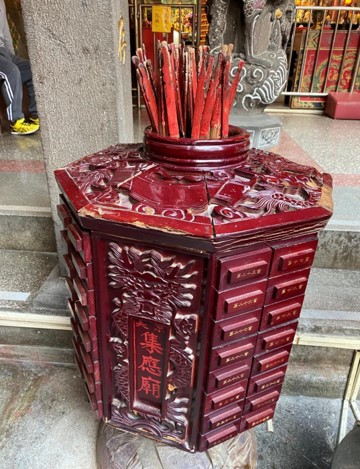
-
After you get a sacred divination, get an oracle stick. Remember the number and put the oracle stick back.
-
Toss the divination blocks again to see if you get another sacred divination. Getting a sacred divination means that you have the right oracle stick.
-
Get the oracle poem that corresponds to the number of your oracle stick. Ask the oracle interpreter to interpret the oracle poem if needed.
6. Evolution of the praying etiquette: “if you are devout, then the deities will listen.”
-
Today, some temples do not use incense. In this case, just clasp your palms together in front of you and bow three times to pray.
最新自 社大行政團隊
- 111-1公民周:社區小故事-我的大新聞
- Education and Entertainment in Jingmei
- Transportation in Jingmei
- Canals and Rivers in Jingmei
- Food in Jingmei
- 【復興景美文化軸帶─尋找新人文渡口】文化社造成果展
- 折頁設計
- 【復興景美文化軸帶─尋找新人文渡口】 青銀共創提案─景美畫傘趣
- 文山學教案工作坊
- 水文化社造萬和水水家園─小小空間魔法師改造工作坊
- 水文化社造─青銀共創提案愛麗絲愛乾淨組至景美夜市進行垃圾不落地行動
- 青銀共創提案活動─台大串市場
- 復興景美文化軸帶,尋找新人文渡口 【文山好行-友善單車環境向前走】公共論壇
- 復興景美文化軸帶,尋找新人文渡口 【現代新渡口】公共論壇
- 水文化社造:暑期親子1日營─小小導覽員第二梯次
- 水文化社造:暑期親子1日營─小小導覽員第一梯次
- 木柵公園的人工浮島
- 移除外來魚種
- 【找回萃湖美力】易拉展
- 【文山水岸-景美溪大河願景】公共論壇紀錄
- 「我們的景美溪願景」焦點團體座談紀錄
- 木柵公園的夜間賞螢活動內容
- 景美溪流域學踏查會議
- 文化社造--青銀共創沙龍-【創業不NG】
- 文化社造--青銀共創沙龍-【創業前該具備的能力-從0到1】
- 文化社造--藝文沙龍-當蘇軾遇到莫札特
- 文化社造--藝文沙龍-都會中的遺圳─霧裡薛圳
- 文化社造--藝文沙龍-作為一名創作者
- 文化社造--藝文沙龍-多元文化‧藝饗美學
- 文化社造--藝文沙龍-新時代的剪花
- 文化社造--景美深度文化旅行導覽活動-景美文化搖籃地
- 文化社造--景美深度文化旅行導覽活動-探訪景美老街
- 文化社造--景美深度文化旅行導覽活動-都會遺圳─霧裡薛圳
- 文化社造--文化旅行導覽人才培訓課程-研討踏查文史景點資料
- 文化社造--文化旅行導覽人才培訓課程-景美街老渡口週邊踏查
- 文化社造--文化旅行導覽人才培訓課程-溪子口老渡口週邊踏查
- 文化社造--文化旅行導覽人才培訓課程-萬隆地區週邊水文化探究
- 文化社造--渡口意象設計工作坊
- 文化社造─公共論壇─尋找新人文渡口
- 文化社造─社造點參訪(兩日)活動
- 文化社造─社造點參訪(大稻埕碼頭、昌吉轉角)
- 文化社造─營造社區人文魅力的公私協力密技研習講座
- 文化社造─景美新人文渡口研習講座
- 文化社造─105年第一場藝文沙龍&深度文化小旅行
- 活化萃湖.打造本土樂園
- 打造原生樂園 社大志工齊摸萃湖外來魚
- 2013 春遊•文山水岸
- 2013年活化萃湖活動 ─寫生、攝影及外來種移除
- 2013 景美溪鴨鴨放流暨淨溪活動
- 2011《文山藝術季─社區河岸藝想節》

